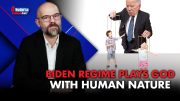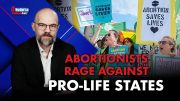
Another county has decided to challenge the meddling of the Freedom From Religion Foundation (FFRF), the secular busybodies who under the guise of “First Amendment watchdogs” make a living out of intruding into the affairs of communities, schools, churches, businesses — just about any group whose individual members exercise their constitutionally guaranteed freedom of religious expression. In this case it is Barron County in northwestern Wisconsin, where the county board has voted 27-0 to disregard the FFRF’s threats of a lawsuit and continue its 50-plus year tradition of opening government meetings with prayer.
After receiving a letter from the FFRF last June warning that the board’s custom since 1957 of beginning meetings with prayer is somehow illegal, the board moved to drop the prayer as a formal agenda item for government meetings, instead making the invocation, which is offered by local clergy, an unofficial act that preceded government business. Of course, that didn’t work for the atheist group, whose lawyer complained in a followup letter that merely taking the prayer off the table and making it informal wasn’t good enough.
In the letter FFRF attorney Patrick Elliott claimed that his group had heard from “Barron County residents who oppose the continued prayers before [County Board] meetings.” He offered a list of court cases in which judges have ruled against other municipalities that had included prayers in their meetings, or tried to hold them informally before the meetings. The atheist group’s intent was clear: Prayers — particularly sectarian “Christian” prayers — must not be heard at the board meetings, just in case someone might assume the county was sanctioning such religious expression and become offended.
According to one account, the FFRF went as far as to count the number of times the prayer offered by various local clergy included an appeal to the name of Jesus, finding that nine of 11 recent invocations included that supposed offense. FFRF attorney Elliott told Mike Nichols, a Wisconsin columnist and senior fellow with the Wisconsin Policy Research Institute, that it might not be enough for the county board to simply broaden its sampling of clergy offering prayers. “Inviting a rabbi to say a prayer or an imam to say a prayer — I don’t know if that is going to save them if they have 20 consecutive Christian prayers,” he said.
Surprisingly, there is a healthy population of Somali Muslims living in Barron County, a rural area overwhelmingly peopled by folks with Germanic and Scandinavian roots and a dairy farming background. But as of yet, no Muslim imams have apparently cared enough about the FFRF-contrived crisis to step forward.
However, during a January board meeting called to discuss the issue, a number of other local residents did step up to make their voices heard, and their opinions overwhelmingly leaned toward recommending that the board thumb its collective nose at the atheist demand. According to the local Rice Lake Chronotype newspaper, “at least nine pastors from area churches, residents from Barron County and other counties and fathers and mothers urged the board to not give in to bullying and continue praying.”
The paper noted that those speaking “read quotes from political leaders and quoted scripture…. The full house heartily applauded every person who spoke during the hour-long public comment portion of the meeting…. The crowd was peaceable but firm in its conviction. The word, ‘Amen,’ often rose up from someone in the crowd. No one who spoke opposed the County Board continuing its practice of praying before its deliberations.”
During the public comments portion of the meeting, one local Lutheran pastor, the Rev. Greg Becker, pointed out that the nation has a rich heritage of prayer in the public square, and noted that the Supreme Court had ruled such prayers did not constitute a violation of the First Amendment. “Just because someone might feel offended doesn’t mean that a constitutional violation has taken place,” he said.
The Rev. Wayne Hall, pastor of another local evangelical congregation, said it was sad that “a certain fringe group can seek to dictate its will to a majority of people in the county by use of intimidation.” He noted that the FFRF often targets small municipalities with limited funds, knowing that such communities will not likely put up much of a fight.
While the FFRF has attempted to intimidate communities with the claim that courts have consistently ruled in its favor in such disputes, someone piped up during the Barron County board meeting to note that in 2009 the atheist attack group had similarly targeted Dodge County over its tradition of prayer before meetings — and that the county had prevailed. With that, reported the Chronotype, “the County Board voted 27-0 to keep prayer on its agenda.”
Such a response is not what the FFRF counts on, and it typically throws its lawyers for a loop. “We are considering litigation,” stammered FFRF attorney Elliott to columnist Mike Nichols, “and what we are doing is monitoring their practices and seeing what they do with the invocation going forward.”
Meanwhile, Barron County Corporation Counsel John Muench told Nichols that “we believe what is going on here is permissible. It is not promoting one particular religion over another. It is not creating a religion. It is just asking for guidance as [the county board members] move into their meetings.”



